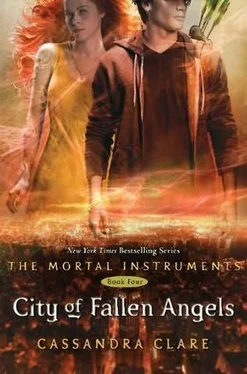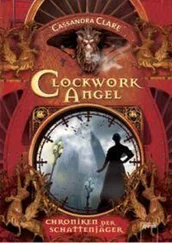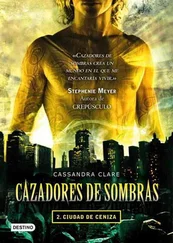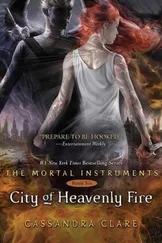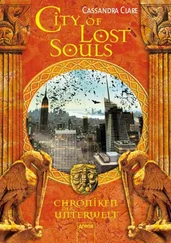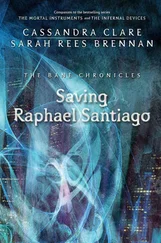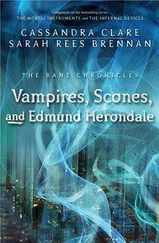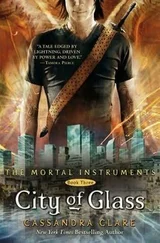City of Fallen Angels
(The fourth book in the Mortal Instruments series)
A novel by Cassandra Clare
For Josh
Sommes-nous les deux livres
d’un même ouvrage?
Part One
Exterminating Angels
There are sicknesses that walk in darkness; and there are exterminating angels, that fly wrapt up in the curtains of immateriality and an uncommunicating nature; whom we cannot see, but we feel their force, and sink under their sword.
—Jeremy Taylor, “A Funeral Sermon”
“Just coffee, please.”
The waitress raised her penciled eyebrows. “You don’t want anything to eat?” she asked. Her accent was thick, her attitude disappointed.
Simon Lewis couldn’t blame her; she’d probably been hoping for a better tip than the one she was going to get on a single cup of coffee. But it wasn’t his fault vampires didn’t eat. Sometimes, in restaurants, he ordered food anyway, just to preserve the appearance of normalcy, but late Tuesday night, when Veselka was almost empty of other customers, it didn’t seem worth the bother. “Just the coffee.”
With a shrug the waitress took his laminated menu and went to put his order in. Simon sat back against the hard plastic diner chair and looked around. Veselka, a diner on the corner of Ninth Street and Second Avenue, was one of his favorite places on the Lower East Side—an old neighborhood eatery papered with black-and-white murals, where they let you sit all day as long as you ordered coffee at half-hour intervals. They also served what had once been his favorite vegetarian pierogi and borscht, but those days were behind him now.
It was mid-October, and they’d just put their Halloween decorations up—a wobbly sign that said TRICK-OR-BORSCHT! and a fake cardboard cutout vampire nicknamed Count Blintzula. Once upon a time Simon and Clary had found the cheesy holiday decorations hilarious, but the Count, with his fake fangs and black cape, didn’t strike Simon as quite so funny anymore.
Simon glanced toward the window. It was a brisk night, and the wind was blowing leaves across Second Avenue like handfuls of thrown confetti. There was a girl walking down the street, a girl in a tight belted trench coat, with long black hair that flew in the wind. People turned to watch her as she walked past. Simon had looked at girls like that before in the past, idly wondering where they were going, who they were meeting. Not guys like him, he knew that much.
Except this one was. The bell on the diner’s front door rang as the door opened, and Isabelle Lightwood came in. She smiled when she saw Simon, and came toward him, shrugging off her coat and draping it over the back of the chair before she sat down. Under the coat she was wearing one of what Clary called her “typical Isabelle outfits”: a tight short velvet dress, fishnet stockings, and boots. There was a knife stuck into the top of her left boot that Simon knew only he could see; still, everyone in the diner was watching as she sat down, flinging her hair back. Whatever she was wearing, Isabelle drew attention like a fireworks display.
Beautiful Isabelle Lightwood. When Simon had met her, he’d assumed she’d have no time for a guy like him. He’d turned out to be mostly right. Isabelle liked boys her parents disapproved of, and in her universe that meant Downworlders—faeries, werewolves, and vamps. That they’d been dating regularly for the past month or two amazed him, even if their relationship was limited mostly to infrequent meetings like this one. And even if he couldn’t help but wonder if he’d never been changed into a vampire, if his whole life hadn’t been altered in that moment, would they be dating at all?
She tucked a lock of hair behind her ear, her smile brilliant. “You look nice.”
Simon cast a glance at himself in the reflective surface of the diner window. Isabelle’s influence was clear in the changes in his appearance since they’d been dating. She’d forced him to ditch his hoodies in favor of leather jackets, and his sneakers in favor of designer boots. Which, incidentally, cost three hundred dollars a pair. He was still wearing his characteristic word shirts—this one said EXISTENTIALISTS DO IT POINTLESSLY—but his jeans no longer had holes in the knees and torn pockets. He’d also grown his hair long so that it fell in his eyes now, covering his forehead, but that was more necessity than Isabelle.
Clary made fun of him about his new look; but, then, Clary found everything about Simon’s love life borderline hilarious. She couldn’t believe he was dating Isabelle in any serious way. Of course, she also couldn’t believe he was also dating Maia Roberts, a friend of theirs who happened to be a werewolf, in an equally serious way. And she really couldn’t believe that Simon hadn’t yet told either of them about the other.
Simon wasn’t really sure how it had happened. Maia liked to come to his house and use his Xbox—they didn’t have one at the abandoned police station where the werewolf pack lived—and it wasn’t until the third or fourth time she’d come over that she’d leaned over and kissed him good-bye before she’d left. He’d been pleased, and then had called up Clary to ask her if he needed to tell Isabelle. “Figure out what’s going on with you and Isabelle,” she said. “Then tell her.”
This had turned out to be bad advice. It had been a month, and he still wasn’t sure what was going on with him and Isabelle, so he hadn’t said anything. And the more time that passed, the more awkward the idea of saying something grew. So far he’d made it work. Isabelle and Maia weren’t really friends, and rarely saw each other. Unfortunately for him, that was about to change. Clary’s mother and her longtime friend, Luke, were getting married in a few weeks, and both Isabelle and Maia were invited to the wedding, a prospect Simon found more terrifying than the idea of being chased through the streets of New York by an angry mob of vampire hunters.
“So,” Isabelle said, snapping him out of his reverie. “Why here and not Taki’s? They’d serve you blood there.”
Simon winced at her volume. Isabelle was nothing if not unsubtle. Fortunately, no one seemed to be listening in, not even the waitress who returned, banged down a cup of coffee in front of Simon, eyed Izzy, and left without taking her order.
“I like it here,” he said. “Clary and I used to come here back when she was taking classes at Tisch. They have great borscht and blintzes—they’re like sweet cheese dumplings—plus it’s open all night.”
Isabelle, however, was ignoring him. She was staring past his shoulder. “What is that?”
Simon followed her glance. “That’s Count Blintzula.”
“Count Blintzula?”
Simon shrugged. “It’s a Halloween decoration. Count Blintzula is for kids. It’s like Count Chocula, or the Count on Sesame Street.” He grinned at her blank look. “You know. He teaches kids how to count.”
Isabelle was shaking her head. “There’s a TV show where children are taught how to count by a vampire?”
“It would make sense if you’d seen it,” Simon muttered.
“There is some mythological basis for such a construction,” Isabelle said, lapsing into lecturey Shadowhunter mode. “Some legends do assert that vampires are obsessed with counting, and that if you spill grains of rice in front of them, they’ll have to stop what they’re doing and count each one. There’s no truth in it, of course, any more than that business about garlic. And vampires have no business teaching children. Vampires are terrifying.”
“Thank you,” Simon said. “It’s a joke, Isabelle. He’s the Count. He likes counting. You know. ‘What did the Count eat today, children? One chocolate chip cookie, two chocolate chip cookies, three chocolate chip cookies . . .’”
Читать дальше
